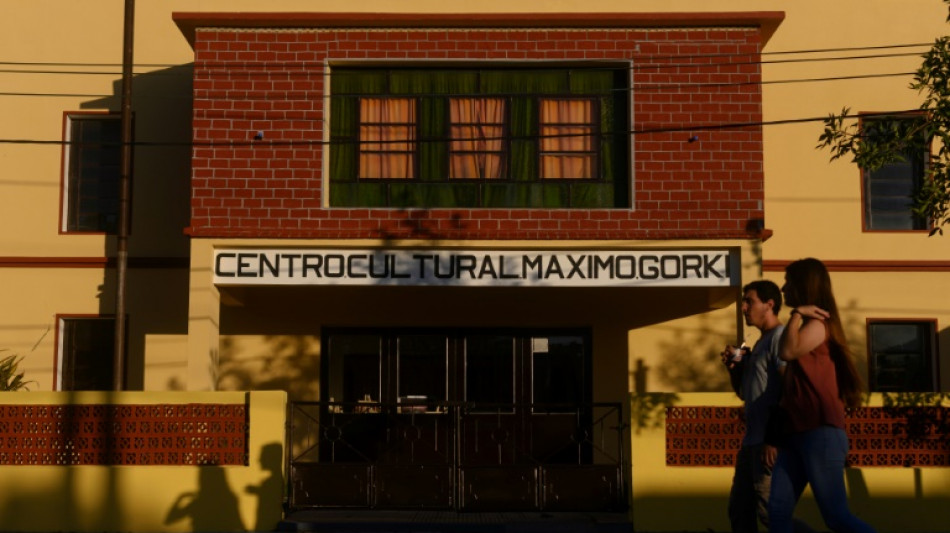
-
 Palestinians welcome ICC arrest warrants for Israeli officials
Palestinians welcome ICC arrest warrants for Israeli officials
-
Senegal ruling party wins parliamentary majority: provisional results

-
 Fiji's Loganimasi in for banned Radradra against Ireland
Fiji's Loganimasi in for banned Radradra against Ireland
-
New proposal awaited in Baku on climate finance deal

-
 Brazil police urge Bolsonaro's indictment for 2022 'coup' plot
Brazil police urge Bolsonaro's indictment for 2022 'coup' plot
-
NFL issues security alert to teams about home burglaries

-
 Common water disinfectant creates potentially toxic byproduct: study
Common water disinfectant creates potentially toxic byproduct: study
-
Chimps are upping their tool game, says study

-
 US actor Smollett's conviction for staged attack overturned
US actor Smollett's conviction for staged attack overturned
-
Fears rise of gender setbacks in global climate battle

-
 'World's best coach' Gatland 'won't leave Wales' - Howley
'World's best coach' Gatland 'won't leave Wales' - Howley
-
Indian PM Modi highlights interest in Guyana's oil

-
 Israel strikes kill 22 in Lebanon as Hezbollah targets south Israel
Israel strikes kill 22 in Lebanon as Hezbollah targets south Israel
-
Argentina lead Davis Cup holders Italy

-
 West Bank city buries three Palestinians killed in Israeli raids
West Bank city buries three Palestinians killed in Israeli raids
-
Fairuz, musical icon of war-torn Lebanon, turns 90

-
 Jones says Scotland need to beat Australia 'to be taken seriously'
Jones says Scotland need to beat Australia 'to be taken seriously'
-
Stock markets push higher but Ukraine tensions urge caution

-
 IMF sees 'limited' impact of floods on Spain GDP growth
IMF sees 'limited' impact of floods on Spain GDP growth
-
Fresh Iran censure looms large over UN nuclear meeting

-
 Volkswagen workers head towards strikes from December
Volkswagen workers head towards strikes from December
-
'More cautious' Dupont covers up in heavy Parisian snow before Argentina Test

-
 UK sanctions Angola's Isabel dos Santos in graft crackdown
UK sanctions Angola's Isabel dos Santos in graft crackdown
-
Sales of existing US homes rise in October

-
 Crunch time: What still needs to be hammered out at COP29?
Crunch time: What still needs to be hammered out at COP29?
-
Minister among 12 held over Serbia station collapse

-
 Spurs boss Postecoglou hails 'outstanding' Bentancur despite Son slur
Spurs boss Postecoglou hails 'outstanding' Bentancur despite Son slur
-
South Sudan rejects 'malicious' report on Kiir family businesses

-
 Kyiv claims 'crazy' Russia fired nuke-capable missile
Kyiv claims 'crazy' Russia fired nuke-capable missile
-
Australia defeat USA to reach Davis Cup semis

-
 Spain holds 1st talks with Palestinian govt since recognising state
Spain holds 1st talks with Palestinian govt since recognising state
-
Stock markets waver as Nvidia, Ukraine tensions urge caution

-
 Returning Vonn targets St Moritz World Cup races
Returning Vonn targets St Moritz World Cup races
-
Ramos nears PSG return as Sampaoli makes Rennes bow

-
 Farrell hands Prendergast first Ireland start for Fiji Test
Farrell hands Prendergast first Ireland start for Fiji Test
-
Gaza strikes kill dozens as ICC issues Netanyahu arrest warrant

-
 Famed Berlin theatre says cuts will sink it
Famed Berlin theatre says cuts will sink it
-
Stuttgart's Undav set to miss rest of year with hamstring injury

-
 Cane, Perenara to make All Blacks farewells against Italy
Cane, Perenara to make All Blacks farewells against Italy
-
Kenya scraps Adani deals as Ruto attempts to reset presidency

-
 French YouTuber takes on manga after conquering Everest
French YouTuber takes on manga after conquering Everest
-
Special reunion in store for France's Flament against 'hot-blooded' Argentina

-
 'World of Warcraft' still going strong as it celebrates 20 years
'World of Warcraft' still going strong as it celebrates 20 years
-
Fritz pulls USA level with Australia in Davis Cup quarters

-
 New Iran censure looms large over UN nuclear meeting
New Iran censure looms large over UN nuclear meeting
-
The first 'zoomed-in' image of a star outside our galaxy

-
 ICC issues arrest warrants for Netanyahu, Gallant, Deif
ICC issues arrest warrants for Netanyahu, Gallant, Deif
-
Minister among 11 held over Serbia station collapse

-
 Historic gold regalia returned to Ghana's king
Historic gold regalia returned to Ghana's king
-
Kyiv accuses Russia of launching intercontinental ballistic missile attack


Uruguay's century-old Russian colony troubled over war from afar
Far away from Kyiv and even further from Moscow, residents of the small Uruguayan village of San Javier -- an old Russian settlement -- look on with dismay at the invasion of Ukraine.
At a first glance, the community's grid plan, low houses and surrounding fields resembles any other rural Uruguayan village -- but a scratch below the surface reveals the history of a site founded more than a century ago by Russian peasants.
Although few of their descendants speak Russian or even carry Russian names, the inhabitants here insist they are "proud" of their Slavic heritage, while also firmly denouncing the motherland's invasion of Ukraine.
San Javier has several Cyrillic inscriptions on display, a "Maximo Gorki" cultural center and five giant matryoshka dolls on the central square.
It all points to a history that is "unique in Uruguay and South America," says Leonardo Martinez, the deputy mayor of the village of 1,800 people.
San Javier's story began in 1913 when 300 families -- originally from Russia's western Voronezh region and followers of the "New Israel" Christian sect that was persecuted by Tsarist Russia -- arrived in Montevideo.
A few months later, around 600 people settled in San Javier, a five-hour drive northwest of Montevideo and flanked by the Uruguay River.
It was the largest autonomous Russian agricultural colony in South America, and quickly became a roaring success.
A century later, the sunflower -- which the colonists introduced to Uruguay -- appears everywhere as the village symbol.
"Looking at photos we feel a bit nostalgic... for the great sacrifice they made," said Martinez, 43, the great-grandson of an original settler.
The mayoral office claims a "high percentage" of the current inhabitants descend from the Russian colonizers, although over time the village has seen a blending of people and cultures, like the country as a whole.
The local restaurant offers the typical Uruguayan grilled meat "asado" as well as "shashlik," a type of lemon-seasoned skewered meat popular across much of the former Soviet Union.
The village square hosts Uruguayan creole folk dances as well as traditional Russian ones.
- Killing 'brothers' -
The village, which has its own museum, has become a tourist site for its Russian history.
But despite those ties, not a single flag or banner proclaiming partisanship can be found in its streets.
"I've not seen explicit support in San Javier" for either country, said Martinez about the war between Russia and Ukraine more than 10,000 kilometers (6,200 miles) away.
"We're against the war, that's obvious," he said. "Against all armed conflict."
Leonardo Lorduguin, a 22-year-old San Javier resident, has set up a Facebook page dedicated to his village.
He is fascinated by the Russian language, which he has been learning for two years -- one of the few of his generation to speak it.
But he would not commit to either side in the conflict.
Like many other villagers, he insists that the first settlers came from "Great Russia" -- an old term that includes territories outside the modern Russian borders.
"In 1913, only Russians came but some had Ukrainian names. They came to Montevideo and were told there was a Russian colony in San Javier," said Lorduguin, reeling off the Russian and Ukrainian surnames of some villagers.
Alejandro Sabelin, 80, is one of the only other villagers who speaks Russian alongside Spanish.
His father was born in San Javier three months after his grandparents arrived there.
He recognizes that the language is being lost in the community. His own children understand Russian better than they speak it.
A picture of his grandparents hangs in his small house.
"I'm really sorry about what is happening because it is almost like killing your brothers," he said of Russia's invasion of its neighbor.
Although he has never visited the homeland of his grandparents, Sabelin says, "I will never stop supporting Russia."
But "the war is awful, what's happening is horrible," he adds.
M.Odermatt--BTB

